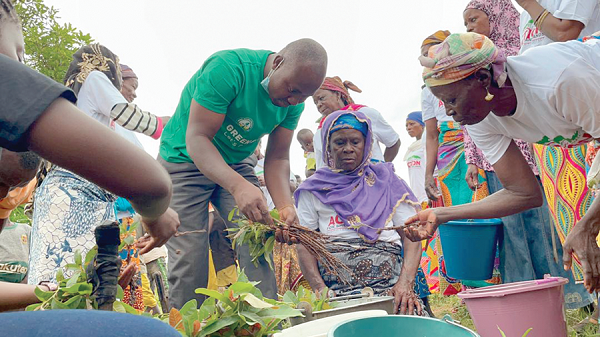
Greening Ghana, setting standards
Of all the important individuals and institutions that joined in the National Tree Planting campaign on Friday, June 11, 2021, the Inspector General of Police (IGP), James Oppong-Boanuh, was the only person that gave me hope about the sustainability of the programme.
Planting a tree at the National Police Training School in support of the campaign, the IGP got other directors at the Police Headquarters to plant 50 trees.
Officers commanding the six training schools of the Police Service were to plant 50 seedlings that day.
Regional, divisional commanders and station officers would plant a minimum of three seedlings each at their various offices and stations.
The IGP also announced how the trees planted were going to be nurtured.
According to him, there was a monitoring and reporting team that would go round offices and stations to ensure that the plants were nurtured.
The leadership of the IGP is shown by the manner in which he got all his rank and file involved in the exercise.
Exemplary too were the details he gave about the monitoring team that would go round to ensure that the seedlings grow to really green Ghana.
Importance
The importance of greening the country cannot be over emphasised.
The US-based World Resource Institute’s (WRI) analysis of satellite data published in 2019 found that Ghana experienced the biggest relative increase in primary forest loss among all tropical countries in 2018.
The report said that the loss of Ghana’s primary forest cover jumped 60 per cent from 2017 to 2018 — almost entirely from its protected areas.
The expansion of cocoa farms, illegal mining and logging, with officials of the Forestry Commission turning a blind eye to the latter, were the main causes of the loss.
The Forestry Commission disputes these figures, rather stating that primary forest loss had increased by 31 per cent between 2017 and 2018.
Be that as it may, even a percentage loss of forest cover is bad for the country in these days and times of galamsey and climate change.
Stunt
That is why the Greening Ghana Project is important. But mere publicity stunts of important people in Ghana planting trees will not automatically make trees grow or the country green.
Perhaps, as the IGP has done, details must be provided about how institutions are going to sustain the greening process.
We must know how all the trees planted on June 11 will be nurtured to grow.
Fortunately, we know how 5000 trees, planted by the Ghana Police Service, out of the five million trees planted, are going to be taken care of.
The rest of the trees planted may be at the mercy of the weather.
Perhaps, the trees planted by the President, his Vice, the Chief Justice and other prominent Ghanaians may survive; after all, no one would think of allowing the first gentleman of the land’s tree to die.
The Forestry Commission, in these days of technological innovation, could have tagged all five million seedlings for the Greening Ghana Project.
Doing that would have helped in tracking them for nurturing.
Additionally, it would have helped for accountability purposes. It would have also provided critical information about the regions with the highest uptake of the seedlings; the lowest uptake, where the seedlings would thrive and where they would not.
If officers of the Forestry Commission are to be deployed to monitor and advise individuals or institutions that planted the trees, then tagging seedlings would have made their work less stressful.
From a story on Graphiconline, with the headline, Greening Ghana Project: ‘Seedlings won’t go waste’ – Forestry Commission, it seems the institution is yet to begin efforts to monitor the seedlings planted.
Perhaps, a cue must be taken from the IGP; before they planted, they had already planned the monitoring and nurturing of the plants.
Ministry of Lands and Natural Resources, after the photo opportunities of the day (which was your work), let us see better work, by also letting the public see the growth and progress of most of the five million seedlings planted!
E-mail: caroline.
